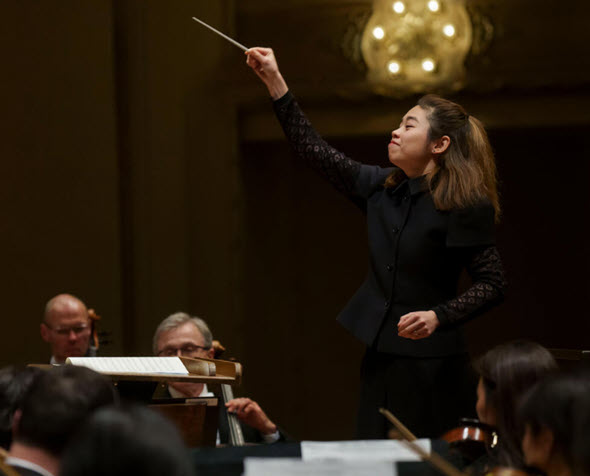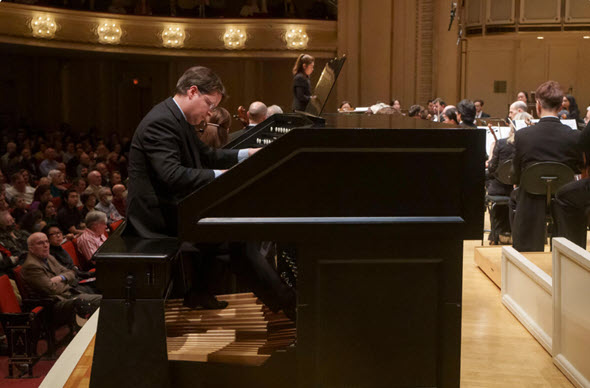In fan-tastic fantasy weekend, CSO serves up ‘Scheherazade,’ sci-fi film ‘Close Encounters’
Review: Chicago Symphony conducted by Elim Chan; also “Close Encounters of the Third Kind,” CSO conducted by Richard Kaufman.
By Lawrence B. Johnson
It was magical. But you had to be at both programs to fully grasp the scope of the Chicago Symphony Orchestra’s weekend of fantastical concerts and the hearts-all-in response of audiences that showered their appreciation — and I daresay affection — on the celebrated local band.
On Thursday and Saturday nights, May 2 and 4, the fare was exotic classicism, Rimsky-Korsakov’s “Scheherazade,” spotlighting both the CSO debut of conductor Elim Chan and the bewitching solos of associate concertmaster Stephanie Jeong. On Friday night and Sunday afternoon, all eyes were on the big screen suspended over the orchestra for a showing of director Steven Spielberg’s 1977 sci-fi charmer “Close Encounters of the Third Kind,” with the CSO providing John Williams’ indispensable musical score live.
The fantastical fun began with as elegant, precise and luminous an account of “Scheherazade” as I ever heard live. Hong Kong native Chan, 37, is a picture of irrepressible energy on the podium, even to the point of gestural histrionics. But there was no questioning the depth of her knowledge of Rimsky-Korsakov’s score or her judgment in dialing back when the CSO’s phenomenal woodwind principals stepped into their gorgeous dialogues and solos.
For all its imperishable popularity, “Scheherazade” is no slam dunk to pull off. While its exoticism and echt romanticism seem unassailable even by superficial treatment, the work is in truth a study guide to brilliant orchestration and evocative tone painting. Chan, who did her graduate studies at the University of Michigan and took master classes with Bernard Haitink, showed her fine schooling in arching lyrical lines and impeccable balances among the luxurious voices on every hand. From the CSO strings, she drew eloquently scaled sonorities from veiled quiet to pulsing ardor.
Punctuating and indeed accentuating the whole were Stephanie Jeong’s narrative violin solos. (The printed program showed CSO concertmaster Robert Chen as the soloist, though that was manifestly not the case. For the second performance, a correction was inserted into the program.) Jeong’s solos caught the very essence of romantic temperament with a seemingly limitless vocabulary of introspection, seduction, intensity and tenderness — all served by a likewise unbounded technical facility.
The first half of Chan’s program was rather thin soup, starting with a perfectly polished turn through Weber’s Overture to his opera “Der Freischutz.” Curious minds wonder why this particular antique is still being recycled when there is so much fresh and stimulating music of our own time that languishes unheard. Much the same might be said of its first-half companion, Samuel Barber’s musty and frankly unremarkable “Toccata festiva” for organ and orchestra, with Paul Jacobs at the organ. Far more interesting and original in its brash wit was Jacob’s virtuosic encore: Charles Ives’ rambunctious Variations on “America.” It’s a mad piece, and Jacobs had a great time with it.
The CSO’s altogether incandescent playing of “Scheherazade” might have led one to ask, at the next night’s “Close Encounters” screening, does this huge audience have any idea how lucky they are to hear such a virtuosic underpinning of the pop-eyed amazement, anxiety and romantic idealism playing out on the screen? Before the question could even be formed, however, the “Close Encounters” audience rendered it moot, twice over: first by remaining in place as the Chicago Symphony played through the end credits and then by standing in a whooping, cheering ovation that surely matched that of the “Scheherazade” house to the decibel.
These film fun nights have taken the symphony orchestra biz by storm, and the CSO offers a clutch of them every season. They draw really well, everyone has a marvelous time and the orchestra extends its circle of public ownership. As you get caught up in the film, it’s easy to forget there’s a high-powered symphony orchestra right in front of you playing this music, which has been stripped out of the soundtrack. But that’s by no means to say the audience doesn’t notice. I’ve attended a slew of these enchanting nights. It’s quite amazing to see the film end but practically no one stand to leave, all hanging around to savor the CSO as it plays through the credits. For “Close Encounters,” members of the CSO Chorus also were on hand to intone Williams’ wordless vocal effects.
Only when the music stops does the film crowd make a peep, and then it’s a roar of appreciation that goes on for a while as solo voices in the orchestra are singled out for acknowledgement. This night the biggest cheer went to tuba player Gene Pokorny. When the alien spacecraft answered the famous five-note sequence of communication with humans, it was Pokorny who got to deliver those bravura basso ripostes. If you couldn’t say the audience exited on a high note, it surely departed on a memorable one.
Next season’s CSO film series begins with “The Wizard of Oz” (Nov. 29-Dec. 1) and continues with “Elf” (Dec. 13-15), “Crouching Tiger, Hidden Dragon” (Jan. 10-11, 2025), “Field of Dreams” (May 30-June 1, 2025) and “Back to the Future” (June 26-28, 2025).





